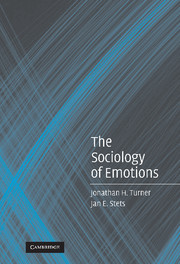Book contents
- Frontmatter
- Contents
- Tables and Figures
- Acknowledgment
- Foreword by Lynn Smith-Lovin
- 1 Conceptualizing Emotions Sociologically
- 2 Dramaturgical and Cultural Theorizing on Emotions
- 3 Ritual Theorizing on Emotions
- 4 Symbolic Interactionist Theorizing on Emotions
- 5 Symbolic Interactionist Theorizing on Emotions with Psychoanalytic Elements
- 6 Exchange Theorizing on Emotions
- 7 Structural Theorizing on Emotions
- 8 Evolutionary Theorizing on Emotions
- 9 Prospects for the Sociology of Emotions
- References
- Index
8 - Evolutionary Theorizing on Emotions
Published online by Cambridge University Press: 05 June 2012
- Frontmatter
- Contents
- Tables and Figures
- Acknowledgment
- Foreword by Lynn Smith-Lovin
- 1 Conceptualizing Emotions Sociologically
- 2 Dramaturgical and Cultural Theorizing on Emotions
- 3 Ritual Theorizing on Emotions
- 4 Symbolic Interactionist Theorizing on Emotions
- 5 Symbolic Interactionist Theorizing on Emotions with Psychoanalytic Elements
- 6 Exchange Theorizing on Emotions
- 7 Structural Theorizing on Emotions
- 8 Evolutionary Theorizing on Emotions
- 9 Prospects for the Sociology of Emotions
- References
- Index
Summary
Most early founders of sociology adhered to an evolutionary view of societal development as moving through stages from simple to ever more complex forms of social organization. These models fell into disfavor in the early decades of the 20th century, only to be resurrected in the 1960s (Lenski, 1966; Parsons, 1966). At about the same time, a new kind of evolutionary theorizing was emerging, one that sought to explain human behavior and social organization in terms of the effect of natural selection on the human genome.
For many sociologists, the emergence of sociobiology, as it was first called (Wilson, 1975, 1978), posed a threat to the discipline because its proponents came from biology and seemed to be arguing that the subject matter of sociology could be explained by reference to genetics. Such reductionism naturally aroused the suspicions, if not outright hostility, of sociologists who were reluctant to explain complex sociocultural formations by reference to elementary biological processes. It was bad enough, many sociologists argued, that behaviorists kept trying to explain human social organization with principles of individual behavior, but for biologists to enter into sociology and attempt to explain sociology's subject matter with notions of genetic fitness was too much. Moreover, it raised for sociologists the ghost of Social Darwinism and eugenics from earlier decades. The notion that genes are “selfish” (Dawkins, 1976), and by virtue of blind natural selection seek to sustain the information that they contain in the gene pool, could hardly account for the topics of interest to sociologists.
- Type
- Chapter
- Information
- The Sociology of Emotions , pp. 261 - 283Publisher: Cambridge University PressPrint publication year: 2005

